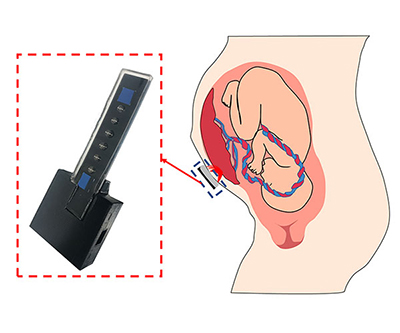
The prototype oxygen sensor next to a diagram of a fetus with forward-facing placenta.
Credit: Thien Nguyen, Ph.D., NICHD
The placenta plays critical roles in fetal development, pregnancy outcomes, and lifelong health. Problems with the placenta can result in conditions like preeclampsia, gestational diabetes, prematurity, and stillbirth. They also can be a marker of later disease for mother and child. A non-invasive, easy-to-use method to monitor the oxygen level of the placenta during pregnancy would be a useful tool for assessing maternal and fetal health.
The Gandjbakhche Lab developed a prototype device that potentially could diagnose pregnancy complications by monitoring placental oxygen levels. The device sends near-infrared light through the pregnant woman’s abdomen to measure oxygen levels in the arterial and venous network in the placenta.
The researchers used the experimental device to monitor oxygen levels in 12 pregnant women with an anterior placenta, which is attached to the front wall of the uterus. Currently, the device cannot monitor oxygen in women with a posterior placenta, which is attached to the back wall of the uterus, because the distance is too far for the light to travel. However, anterior placenta is associated with a higher rate of complications than posterior placenta, such as postpartum hemorrhage and an increased need for labor induction or cesarean delivery.
Of the 12 women in the study, five experienced a pregnancy complication, including hypertension, a short cervix, and polyhydramnios (excess amniotic fluid). On average, the women with complications had a placental oxygen level of 69.6%, a difference statistically significant from the 75.3% seen in the healthy pregnancies in the study.
While further study is needed before the device could be used routinely, the results mark a first step toward continuously monitoring placental oxygen levels to assess maternal and fetal health.
Learn more about the Maternal-Fetal Medicine & Translational Imaging Group: https://www.nichd.nih.gov/about/org/dir/affinity-groups/MFMTI
 BACK TO TOP
BACK TO TOP